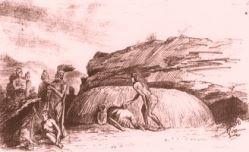|
J'utilise ces trois langues pour l'étude du rongo et du rongo-rongo car la
tradition orale des Rapa Nui raconte qu'ils venaient des Iles Marquises
(Hotu Matua venait de Hiva) et que la provenance des Marquisiens se
situait à Vava'u aux Tonga. Leurs ancêtres s'appelaient Atea et Atanua.
Cf. ma publication " LA PAROLE PERDUE RONGO O'ONO " 
Ra : ciel, firmament.
Ra : ici, là.
Rà : là bas, ici.
Ra : lever du jour (ancien).
Ra : sun, heat, as of the sun rays.
Ra : the name of the ancient mat sail that was used on ocean, going canoes.
Ra ki : lumineuse connaissance.
Raa : jour, lumière.
Raa Miru : tribu de Rapa Nui.
Rahi : beaucoup.
Rai : n'existe pas, voir rahi.
Raki : n'existe pas.
Ran : n'existe pas.
Ranga : eau courante, eau vive.
Ranga : faire flotter quelquechose, pêcher quantité de petits poissons.
Ranga : former une cuvette.
Rangi : Atua.
Rangi : ciel, firmament, nuages.
Rangi te ingoa : appeler quelqu'un, exclamer, crier.
Rano : eau du volcan.
Rano : nom d'une tribu du Rano Raraku (Tonga) ; actuellement Riroko.
Rano : nom, désignatif de l'ancêtre Tonga par excellence.
Rara : coté (ancien) lieu.
Rara : chauffer pour assécher.
Rara : enquêter, se renseigner, écouter les doléances (ancien).
Rara mata'u : droit ancestral.
Rara maui : gauche.
Raranga : tisser.
Rau : denotes a collectif nomber of two hundred.
Rau : many.
Rau : sign of plurality ; emphasing prefix.
Rau : to spread out, to expand.
Raua : eux, elles, ils.
Rau'a : pluralité.
Rau-rau : reduction of rau.
Rava kau : bon nageur.
Rava rava : beaucoup.
Rave rave : n'existe pas.
Ree : trimphe, victoire.
Rei : clavicule.
Rei : cou, poitrine, pectoral.
Rei : dans le chant la coupure durant laquelle le tohuka demande le
silence pour chanter seul. O rei ! Il arrête le chant reinga (en groupe)
pour être le seul à clamer des paroles sacrées.Voir relation avec re-i,
re-o, rei-nga, renga.
REI : that part of a song repeated after each verse.
Rei miro : collier de bois à usage du Tohuka U Peka - astrologue.
Rei-nga or Reinga : the chorus of songs or Pe'e.
Reinga : chorus.
Rei-nga : le groupe accompagne le tohuka durant le chant
Reinga varua : myth place of souls or spirits.
Rei-rei - hé rei : se marcher sur les pieds.
Renga : beau, bon (ancien).
Reo : son, voix.
Reo reo : faux, menteur.
Reva : native tree (cerbera lactaria).
Reva : climate.
Reva : general term for flag.
Reva : lever l'ancre.
Reva : pendant, suspendu, drapeau (moderne).
Reva : quitter la terre par bateau ou par avion.
Reva : separated, divided, desunited.
Reva : to depart, to go away, to leave as a vessel leavign port.
Reva : yellow dye.
Ri : peuple, peuplement.
Ria : granit, pierre dure (ancien).
Ria : morceau, portion, partage.
Ria-ria : appréhension, horreur, peut, panique.
Rionu : n'existe pas.
Rio-rio : consacré aux Dieux.
Riù : bilge water.
Riù : to turn as a person turning round.
Riu : name of leakage ; leaking ; that which enters or escape by leaking ;
to let any fluid.
Riù : rien.
Riù : the hold of a ship. ; the bilge of a shop ar canoe ; the cavity of
the belly ; the belly of fish or beast.
Riva-riva : très bien, très bon.
Roa : beaucoup, grand (ancien).
Roa : loin (ancien).
Rori : revenir, retour de quelqu'un ou de quelquechose.
Roro : acide, vinaigre.
Roro : mental, cérébral.
Roro : sexe, graisse animale (roro moa).
Ru : mythology ; was the sun of Atea y Papa, the good of Earthquakes.
Ru : famous ancestor of the Polynesian race.
Ru : to shake, to agitate, to tremble.
Rua : deux (ancien).
Rua : lieu pour pêcher.
Runga : sur, au-dessus de.
Ru-reinga : chorus mouvement.
|
